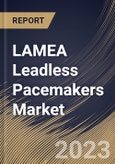Small and implantable, leadless pacemakers regulate cardiac rhythms on their own without the need for traditional wire connections. Several factors, including the aging population's increased susceptibility to cardiovascular diseases, the rise in bradyarrhythmia cases, the growing number of product approvals, the lucrative leadless pacemaker pipeline, and the advantages of leadless pacemakers over traditional pacemakers, are expected to fuel market growth.
Leadless pacemakers, a groundbreaking innovation in cardiology, are miniaturized wireless devices designed to regulate and maintain the heart's rhythm. They represent a remarkable departure from traditional cardiac pacing systems, which rely on leads and a pulse generator implanted beneath the skin. In recent years, the market has witnessed a surge in interest and adoption due to their numerous advantages, including reduced invasiveness, lower infection risk, and improved patient comfort. This innovation has set in motion a series of developments that are reshaping the way cardiac rhythm disorders are managed, marking a new era in cardiology.
One of the notable recent trends in the market is the growing preference for leadless devices over traditional transvenous pacemakers. The conventional transvenous pacemakers, with leads that traverse veins to connect to the heart, have been associated with complications such as lead fractures, infection risks, and limited longevity. In contrast, leadless pacemakers are entirely self-contained, eliminating the need for leads and subcutaneous pulse generators. This trend reflects the desire for less invasive and safer treatment options among patients and healthcare providers.
Moreover, the aging population in the LAMEA region has contributed to the demand for leadless pacemakers, and healthcare digitization plays a vital role in addressing the healthcare needs of elderly patients. As more individuals enter the age group most susceptible to heart-related conditions, the integration of digital healthcare tools helps manage their cardiac health effectively. Remote monitoring and telehealth consultations are particularly valuable for elderly patients who may have mobility limitations.
The United Nations Economic Commission for Latin America and the Caribbean specified that 88.6 million people above the age of 60 lived in the Latin America region as of 2022. This represented 13.4% of the total population, a proportion that will reach 16.5% by 2030. These factors collectively contribute to the growing adoption of leadless pacemakers as a crucial component of modern cardiac healthcare.
The Brazil market dominated the LAMEA Leadless Pacemakers Market, By Country in 2022, and would continue to be a dominant market till 2030; thereby, achieving a market value of $12,436.7 Thousands by 2030. The Argentina market is showcasing a CAGR of 22.3% during (2023 - 2030). Additionally, The UAE market would register a CAGR of 21.3% during (2023 - 2030).
Based on Type, the market is segmented into Micra Transcatheter Pacing System, and Others. Based on End-use, the market is segmented into Hospitals, and Outpatient Facilities. Based on countries, the market is segmented into Brazil, Argentina, UAE, Saudi Arabia, South Africa, Nigeria, and Rest of LAMEA.
The market research report covers the analysis of key stake holders of the market. Key companies profiled in the report include Medtronic PLC, Abbott Laboratories, Boston Scientific Corporation, Biotronik SE & Co. KG, Lepu Medical Technology Co., Ltd, Integer Holdings Corporation, MicroPort Scientific Corporation, Osypka AG, Terumo Corporation, and EBR Systems, Inc.
Scope of the Study
Market Segments Covered in the Report:
By Type- Micra Transcatheter Pacing System
- Others
- Hospitals
- Outpatient Facilities
- Brazil
- Argentina
- UAE
- Saudi Arabia
- South Africa
- Nigeria
- Rest of LAMEA
Key Market Players
List of Companies Profiled in the Report:
- Medtronic PLC
- Abbott Laboratories
- Boston Scientific Corporation
- Biotronik SE & Co. KG
- Lepu Medical Technology Co., Ltd
- Integer Holdings Corporation
- MicroPort Scientific Corporation
- Osypka AG
- Terumo Corporation
- EBR Systems, Inc.
Unique Offerings
- Exhaustive coverage
- The highest number of Market tables and figures
- Subscription-based model available
- Guaranteed best price
- Assured post sales research support with 10% customization free
Table of Contents
Companies Mentioned
- Medtronic PLC
- Abbott Laboratories
- Boston Scientific Corporation
- Biotronik SE & Co. KG
- Lepu Medical Technology Co., Ltd
- Integer Holdings Corporation
- MicroPort Scientific Corporation
- Osypka AG
- Terumo Corporation
- EBR Systems, Inc.








